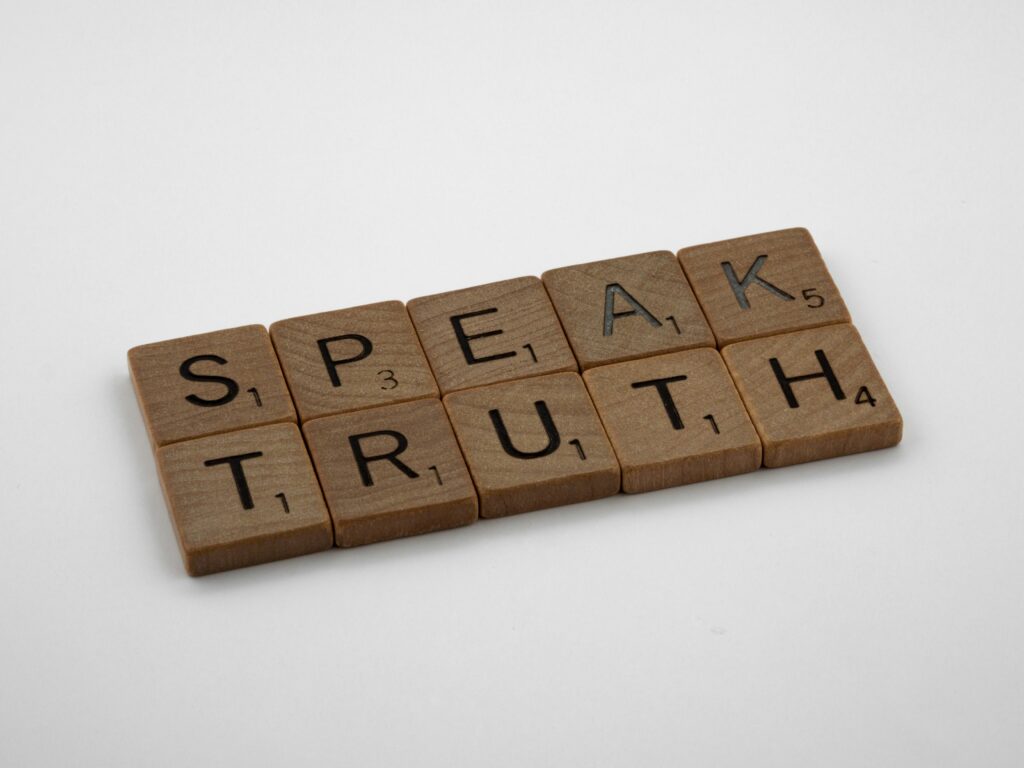
Jesus said, “the truth will set you free”. These are powerful words that have thunderously echoed throughout history. And yet we often find ourselves resonating not so much with the weighty words of our Savior, but the questioning words of his Condemner. “What is truth?” Pontius Pilate retorted after Jesus told him that those who belong to the truth listen to his voice. What is truth, anyway? Nowadays we get awfully mixed up when discussing matters of truth. And when it comes to the painful church wounds, the situation gets even more muddy. How can we heal from our spiritual injuries if we cannot sort out what is true and what isn’t? It’s not like we have a physical gash or a bruise to point to. Many of us have even endured having our pain minimized or questioned by others at church, leaving us unsure how to conceptualize our experience. This article addresses this by slicing the notion of “truth” into three manageable chunks so we can get to the bottom of the hurts we feel. Prayerfully, we will each find healing and recovery through this process.
Emotional Truth
A wise brother once taught me the snappy little phrase, “Feelings first, facts follow”. Whenever I counsel couples in my therapy practice I inevitably use this powerful saying. Emotions are always true. Hear me again: emotions are always true! They are always valid. We never need to argue with them. We certainly don’t want to deny them, in ourselves or in other people. If someone feels hurt, they are hurt. As listeners, it is our job simply to believe them. We don’t need to defend, reason, or challenge. Why do we sometimes get so defensive when we hear stories of other people’s church-based pain? Some churches have a history of denying the pain of others, but to what end? What does a fellow church member or ministry leader receive or preserve by contesting or minimizing a member’s trauma narrative? If someone tells you they’re hurt, trust that this is true. Your validation will make a huge difference.
Sometimes we deny our own emotions as well. We say to ourselves, “I’m fine” when we are not fine. Those of us used to being “sold out” or “radical” in our faith have often learned to dismiss negative emotions as hindrances to the mission or even dangerous to our salvation. We don’t want to be labeled as victims or whiners. So we generate enormous amounts of energy in the act of suppressing those strong (and crucial!) mental signals. Ironically, this resistance is a bit like holding in a sneeze; we pay an even larger price for not letting it happen.
What if instead of denying our own emotions, we allowed ourselves to feel them? The shortest verse in the Bible is “Jesus wept” (John 11:35). The author and perfecter of our faith allowed himself to feel his emotions. When he was angry, he let himself feel anger. When he was joyful, he openly expressed it. And yes, when he felt sorrow, he wept. Someone once said “confession is acknowledging the truth”. What if the act of allowing ourselves to feel our emotions was a godly act of confession before God that brings healing?
Situational Truth
We must not forget that although feelings come first, “facts follow”. We might feel a certain way, and yet our thinking and circumstances on which those emotions are based could be technically untrue. Sometimes the hurt we feel isn’t based as much on the direct words and actions of someone at church, so much as our interpretation of those words and actions. And this really matters, because the objective truth of a “perpetrators” intent when she says or does something hurtful is a fundamental aspect of what hurts us emotionally. For example, let’s say that I hit you with my car (scary, right?). Does it matter what my intent was? If the reason I hit you with my car was that I was momentarily distracted and didn’t see you on the crosswalk, that is one thing. However, if I sped up because I wanted to harm you that is quite another. Intent matters.
Now don’t get me wrong: either way, you still got hit by a car. Can we acknowledge that? Two thousands of pounds of metal and glass have crushed and broken your body. On some level, who cares about intent because right now you are bleeding on the pavement. Likewise with church traumas no one is saying that your pain isn’t utterly painful. In some respects, all that matters is that you are injured. Except for one thing:
When it comes to healing spiritual injuries you have a superpower.
Physical injuries are real, regardless of our perception of them. Denying a broken leg does not heal your leg. But spiritual and emotional injuries aren’t like that. We actually have some agency when it comes to the severity of our emotional wounds. How we see the situation changes the degree of woundedness, and that is good news for us.
This brings us back to intent. If we can, in spite of the throbbing spiritual wound we’ve incurred, manage to understand our harmer’s intentions, it can remove some of the sting. And sometimes, it removes all of the sting. I go into much more detail about this idea in my book, Spiritual Trauma: A Guide for Healing Your Heart from Church Hurts. In it, I explain how we can tap into that superpower to bring about our own healing. But here’s a hint: it starts with being able to see clearly what the situation was and then applying new eyes. Pursuing the objective truth about what happens makes us less subject to the triggers and reactive impulses living in our bodies and allows our minds to take the wheel.
Consider Hanlon’s razor: Never attribute to malice that which is adequately explained by stupidity. In other words, people rarely act out of hatred or intent to harm. The vast majority of a person’s harmful words and actions come from carelessness, thoughtlessness, immaturity, ignorance, misunderstanding, mistaken consent, their own trauma, anxiety, doctrinal error, and many other motives that are decidedly not based on an intention to hurt you.
Affirming Emotional Truth Allows Us to Accept Situational Truth
Why do we resist attributing a person’s actions to the list above? Could it be because this would represent a loss for us? Is it possible that setting down a “villian” narrative somehow threatens the validity of what we feel? I contend that the more we allow ourselves to affirm the gravity of how we feel with no strings attached, the less we will feel compelled to condemn our harmer. We can release any fear about what this pain might mean about us. When we give ourselves full permission to be wounded – to acknowledge the depth of our pain – we also unlock the capacity to heal. And part of healing means adopting the whole truth about what happened to us: what they did, what we did, and how we might have misunderstood where they were coming from.
As a side note, if you are the victim of atrocious abuse or lording over behaviors, this might not apply in the same way. This is never to say that one should avoid getting help for physical abuse, sexual abuse, or any kind of bullying. Nor should we ever deny the real and egregious harms of those acts. There is no such thing as an error of perception when it comes to being sexually assaulted by a ministry leader. This advice pertains to the kinds of relational, “everyday” transgressions that happen in tight-knit churches such as unkind or harsh words, decisions made without us, excessive control behaviors, and other difficult ministry situations.
At the end of the day, we must cling to the truth. We must not deny the factualness of emotional and spiritual trauma in ourselves and others. That would be a denial of the truth. It is not only appropriate but often critical for us to speak about the ways we have been harmed at church. As Jesus said, “there is nothing concealed that will not be disclosed” (Luke 12:2). But at the same time, we must also get clear about where the person who hurt us was coming from and what actually was said or done. Satan wants us to make a monster out of the person who wounded us, but in the end this only leads to further harm to ourselves. Let us lay claim to this superpower and take back what is rightfully ours to possess: stewardship of our own hearts before God. The truth can set you free.
